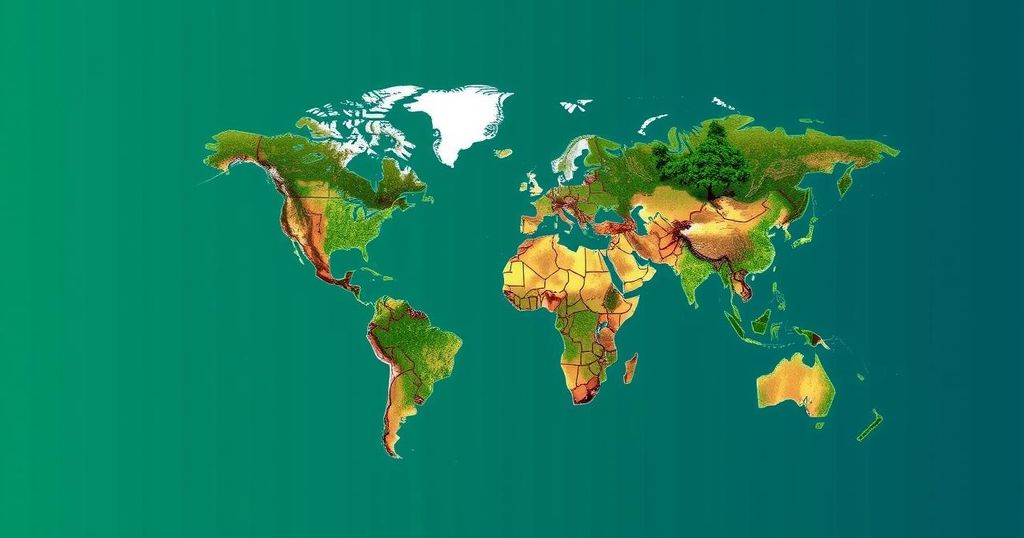UN Warns of Insufficient National Climate Commitments Ahead of COP29
The United Nations has reported that current national pledges to reduce greenhouse gas emissions are insufficient to meet the Paris Agreement’s goals, indicating only a 2.6% reduction by 2030, while a 43% cut is necessary. The COP29 climate talks in Baku will focus on negotiating a new emissions trading system and financial support for developing nations to enhance their climate targets.
The United Nations has issued a stark warning regarding the inadequacy of national commitments aimed at reducing greenhouse gas emissions in the face of impending climate negotiations. As nations prepare for the next climate change conference, the UN’s assessment indicates that the submitted “nationally determined contributions” (NDCs) will only decrease global emissions by 2.6% from 2019 to 2030, a modest increase from 2% reported the previous year. This rate falls drastically short of the 43% reduction scientists deem necessary to adhere to the Paris Agreement’s objective of capping the rise in global temperatures at 1.5 degrees Celsius. Simon Stiell, the Secretary General of the United Nations Framework Convention on Climate Change (UNFCCC), stressed the urgent need for more substantial commitments, stating, “Current national climate plans fall miles short of what’s needed to stop global heating from crippling every economy and wrecking billions of lives and livelihoods across every country.” Nations are expected to strengthen their NDCs by February next year, potentially marking a significant turning point in climate action. Encouraging nations to embrace more ambitious targets will depend heavily on the forthcoming COP29 climate talks, slated to take place in Baku, Azerbaijan. During this conference, nearly 200 countries will negotiate crucial details regarding a new global emissions trading system and a $100 billion annual financial initiative aimed at supporting developing nations in achieving their climate objectives. In a parallel report, the World Meteorological Organization (WMO) revealed that atmospheric greenhouse gas levels continue to surge at an unprecedented rate, with carbon dioxide (CO2) concentrations reaching alarming heights of 420 parts per million in the last year. This figure signifies an increase of 2.3 ppm from the previous year. The report emphasized the urgent necessity for decision-makers to recognize the serious implications of these statistics for global climate stability. The situation is further exacerbated by notable increases in CO2 emissions attributed to catastrophic events such as forest fires that have recently plagued regions, including Canada. As WMO Secretary General Celeste Saulo articulated, “These are more than just statistics. Every part per million and every fraction of a degree temperature increase has a real impact on our lives and our planet.”
As climate change intensifies, nations worldwide face mounting pressure to fulfill their commitments under the Paris Agreement to limit global warming. The UNFCCC’s annual assessment of national climate pledges, or NDCs, highlights the urgency for countries to strengthen their efforts in reducing greenhouse gas emissions. The scientific consensus underscores the need for significant emission cuts to prevent dire environmental and economic consequences. The upcoming COP29 climate conference serves as a critical platform for international dialogue, where developed and developing countries must navigate complex negotiations to address climate financing and regulatory frameworks effectively.
In summary, the UN’s recent report on national climate pledges reveals a troubling shortfall in emissions reduction commitments necessary to combat climate change effectively. With NDCs only poised to reduce emissions by a mere 2.6%, the stark need for more ambitious targets is evident. The forthcoming COP29 discussions will play a pivotal role in shaping the future of global climate action, emphasizing the interconnectedness of financial support and ambitious policy-making. The urgency of the climate crisis demands immediate attention and decisive action from all member states to safeguard the planet for future generations.
Original Source: kfgo.com




Post Comment